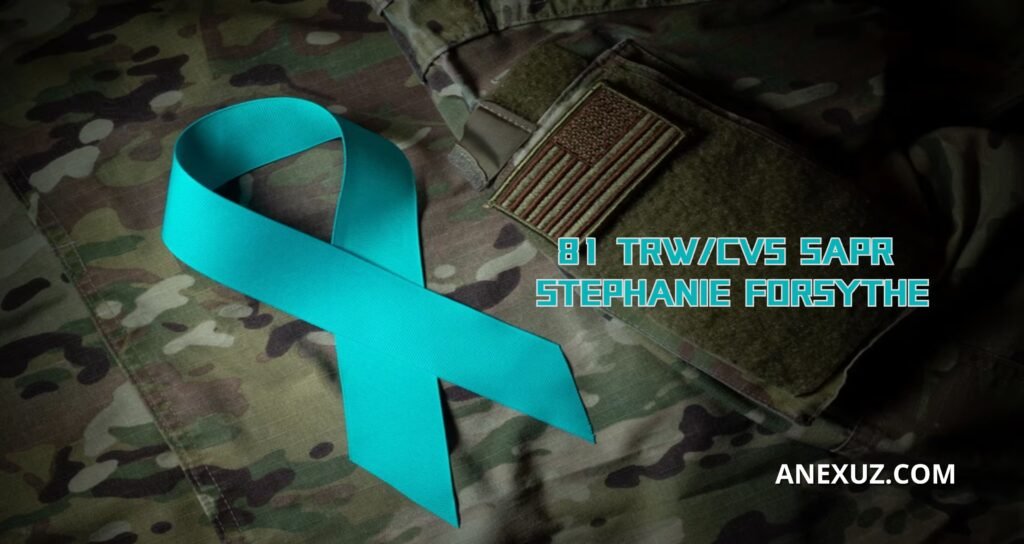Introduction: Who is Stephanie Forsythe, 81 TRW/CVS SAPR Stephanie Forsythe?
Stephanie Forsythe is an outstanding SAPR program advocate at the 81st Training Wing (81 TRW), under the Commander’s Support Staff (CVS). Her position is critical in making sure that it gets through to people on Keesler AFB, Mississippi the call towards education, reporting and recovery of sexual assault prevention.
The Role of SAPR: Protecting the Service Members
The SAPR program is designed for setting up a secure and respectful environment where such victims are protected and empowered to report incidents of sexual assault. This would enable her to be at the forefront of spreading awareness and educating the community, thereby providing confidential support to the victims. This would ensure service members have access to recovery-related resources while being part of a prevention culture.
81 TRW/CVS SAPR Stephanie Forsythe Influence at 81 TRW/CVS
She extends her work beyond preventing and reporting by conducting workshops, training sessions, and campaigns. With this action, she is an influential individual in the changing dynamics of how sexual assaults are treated within military circles. Having achieved success and passion from her experience, she now became a crusader for cultural change regarding respect, accountability, and empowerment. The performance of her 81 TRW/CVS has improved significantly in handling sexual assaults cases.
Why SAPR Matters in Military Settings
The military setting is unique as compared to all others and presents some particular challenges related to sexual assault. Their victims typically have the obstacles of hierarchy, fear of retaliation, and societal stigma that attaches to the victim. Forsythe through the SAPR addresses these head-on by offering the options for confidential reporting, ensuring legal support systems are available, and providing a survivor-centric approach.
Stephanie Forsythe’s Leadership and Vision
The leadership of Stephanie Forsythe in SAPR is due to empathy and in-depth understanding of complexities around the issues that military members face. She also supports a victim-first approach whereby survivors are provided with tools and resources to regain control over their lives. To such an end, this office at 81 TRW has been a beacon of hope for so many.
Educational and Awareness Programs
One of the strategies of Forsythe is informing and engaging. She has numerous programs that are constructed to educate from the enlistment newcomer to the seasoned officer the objective: how to create the right mindset by respect, consent, and intervention. This entails ordinary workshops and campaigns focused on eliminating the barriers to reporting and debunking stigmas around victimhood.
Supporting Victims: Safe Space
Another very critical work of Forsythe is to give a safe and confidential environment for survivors to give their accounts. The SAPR office ensures all reports are handled confidentially with legal protection for the survivor’s choice, whether restricted or unrestricted reporting.
Restricted and Unrestricted Reporting: Difference
It is very important for the military’s survivors to know which is the difference between the two: restricted and unrestricted reporting:
- Restricted Reporting: The victim can report an incident, but this is done without an official investigation. It means the survivor has a time for assistance and support without the pressure of legal processes.
- Unrestricted Reporting: Involves a formal investigation by military authorities. The victim receives legal assistance, and the case is to be taken seriously for an intensive investigation.
Forsythe and her organization are guiding each step of the way regarding options available so that those survivors may make informed decisions regarding their needs.
How to Ask SAPR at 81 TRW/CVS SAPR Stephanie Forsythe
1. What is the SAPR program?
The Sexual Assault Prevention and Response (SAPR) program is an initiative meant to prevent sexual assault within the military and offer support to its victims.
2. How do service members report sexual assault?
The survivor will have control over the reporting process since sexual assault of service members can be reported through either restricted or unrestricted reporting options.
3. What services will be available to survivors within 81 TRW/CVS SAPR Stephanie Forsythe?
A: There are confidential counseling, assistance with the referral for legal counsel, and medical care available to survivors through the SAPR office.
4. Why is SAPR important in the military?
A: The military context is quite distinctive, and some of the challenges facing it are rank hierarchies and tight-knit communities; hence, a focused course on addressing these factors is required.
5. What does Stephanie Forsythe contribute to the SAPR mission?
A: 81 trw/cvs sapr Stephanie Forsythe leads SAPR in 81 TRW/CVS and conducts training, education, and advocacy for the support that victims of sexual assault need.
Conclusion: 81 TRW/CVS SAPR Stephanie Forsythe Legacy
Through her tireless work, 81 trw/cvs sapr Stephanie Forsythe has made tremendous strides in the prevention of sexual assault at 81 TRW/CVS. There is much more to be accomplished in addressing the issues of the service member; however, she creates a space that is respectful, accountable, and supportive. The SAPR program serves as a valuable resource, not only for the survivor but also to the larger military community, under her guidance. See More.
